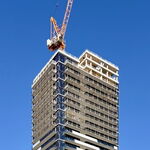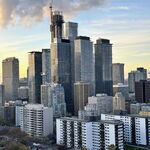steve_toronto
New Member
A question closely related to the very existence of a real estate bubble is to rent or to buy. I have believed it
for awhile that Toronto is facing a real estate bubble or a correction to say least. Therefore, I was
surprised to find out that even in today's market, one would be better off to buy a home than to rent one in
today's Toronto, according to the calculation of the following site from CNN;
http://money.cnn.com/2010/10/08/real_estate/rent_vs_buy/index.htm.
The following numbers, based on a one-plus-one condo in the downtown core, are used in the calculation, and they are very realistic.
Rent:
1950 including one parking and one locker
0 for no extra costs, (rental covers all utilities)
20 for renter's insurance premium
2% annual rental increase
Purchase:
420K purchase price
25% Down payment
3.7% mortgage rate
25 mortgage term (years)
2500 property tax
2% annual appreciation
The comparison, based on 5 years and 1.5% annual inflation rate, shows that the renter will pay $46,000 more than the purchaser.
Do you really believe it is better to buy than to rent in Toronto today?
Appendix the result from the calculation
Buying a home would save you approximately $45,937 (in today's dollars) over 5 years, compared to renting, based on the assumptions you provided.
Cost comparison
[1] Rent $123,024
[2] Buy $74,957
Mortgage payments $94,356
Property insurance $0
Property taxes $13,010
Maintenance $24,000
Opportunity cost $10,558
Tax savings (interest/taxes) $23,253
Home Appreciation $43,714
That is, the difference is $45,937.
for awhile that Toronto is facing a real estate bubble or a correction to say least. Therefore, I was
surprised to find out that even in today's market, one would be better off to buy a home than to rent one in
today's Toronto, according to the calculation of the following site from CNN;
http://money.cnn.com/2010/10/08/real_estate/rent_vs_buy/index.htm.
The following numbers, based on a one-plus-one condo in the downtown core, are used in the calculation, and they are very realistic.
Rent:
1950 including one parking and one locker
0 for no extra costs, (rental covers all utilities)
20 for renter's insurance premium
2% annual rental increase
Purchase:
420K purchase price
25% Down payment
3.7% mortgage rate
25 mortgage term (years)
2500 property tax
2% annual appreciation
The comparison, based on 5 years and 1.5% annual inflation rate, shows that the renter will pay $46,000 more than the purchaser.
Do you really believe it is better to buy than to rent in Toronto today?
Appendix the result from the calculation
Buying a home would save you approximately $45,937 (in today's dollars) over 5 years, compared to renting, based on the assumptions you provided.
Cost comparison
[1] Rent $123,024
[2] Buy $74,957
Mortgage payments $94,356
Property insurance $0
Property taxes $13,010
Maintenance $24,000
Opportunity cost $10,558
Tax savings (interest/taxes) $23,253
Home Appreciation $43,714
That is, the difference is $45,937.
Last edited:




